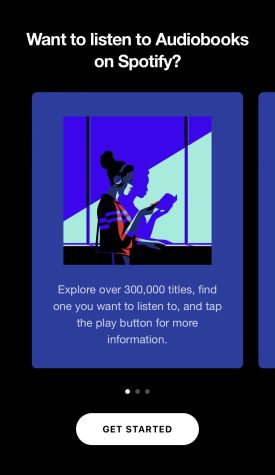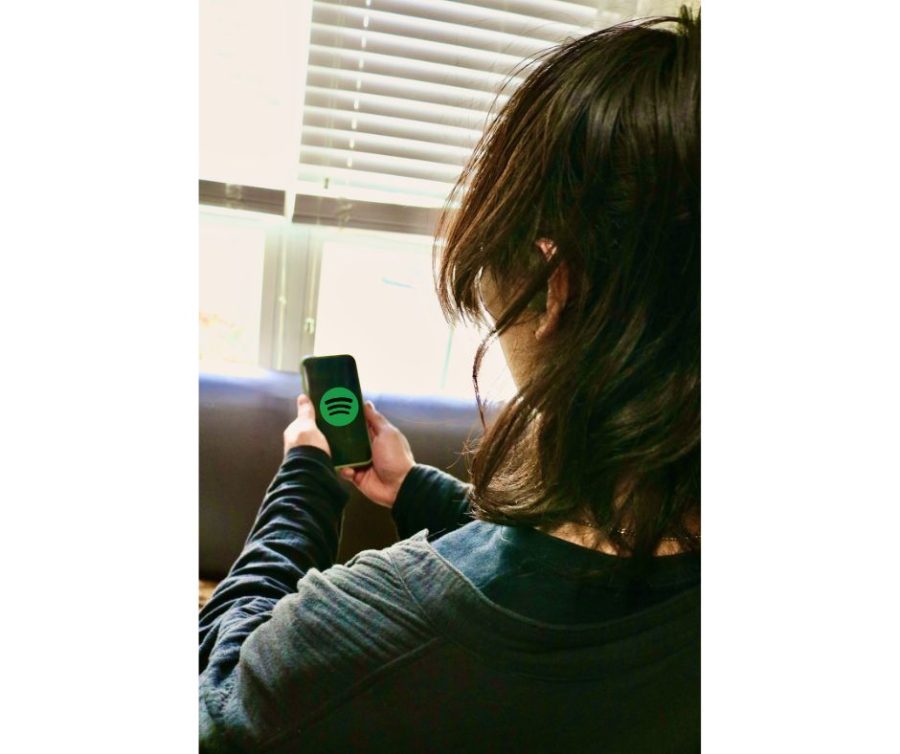Spotify Adds Audiobooks to Library
October 5, 2022
Spotify officially announced and implicated the addition of audiobooks to its already diverse library of digital media. At launch, the audiobook library will contain around 300,000 titles, a number that is only expected to increase as this particular function of the application grows in popularity.
The decision to add audiobooks will make them readily available to Spotify users on the platform, however they must be purchased individually regardless of one’s subscription status on the app. This requisite to pay for individual titles is unique to audiobooks and is not employed in the music or podcast part of this application.
Aside from the addition of this paywall, all other aspects of the way consumers are able to interact with the media stays the same. This includes being able to download titles for offline listening, speed controls so one can listen at their optimal pace, and the presence of audiobooks within the application’s search function so one can look for specific titles they want to listen to.
Spotify is campaigning to emerge as the one stop shop for digital media in the postmodern era, a period which has seen unprecedented advancements in technology in all facets of human existence. The audio streaming giant has been forthright about their desire to dominate all digital media markets, including audio services.
In relation to the addition of audiobooks as part of this effort, Spotify released a statement saying that it is “committed to being the world’s most popular audio streaming service”.

This recent development stands to greatly impact people’s patterns of digital media consumption, especially given Spotify’s remarkable influence as it is the primary outlet through which many people consume all different kinds of digital media. GC mass communications professor Chad Whittle believes that Spotify’s decision to enter the audiobook market could have a broad array of impacts on the digital media landscape, including the fact that it will introduce a whole new group of consumers to audiobooks.
“Spotify is one of the most popular audio apps in the world,” said Whittle. “The app is already popular for music and increasingly for podcasts, so while users are on the app searching for music and podcasts, many will discover audiobooks for possibly the first time.”
According to the CEO of Spotify Nic Zicherman, audiobooks currently make up 6-7% of the overall book market, a statistic that could certainly grow as a whole new and extensive group of consumers are exposed to the opportunity to purchase them.
Whittle believes the addition of audiobooks to Spotify will certainly increase their consumption among the general population, however, there is something that is intrinsically valuable to the reading of physically tangible media that will keep it around.
“I think no doubt more people will use audiobooks and enjoy listening to them, but I think reading books, whether it’s a paperback or on a Kindle device, is something that is never going to go away,” said Whittle. “Even among students I ask about reading digital copies over print, the majority of students prefer print over digital. It’s hard to beat the experience of reading a physical book.”
Despite the remarkable practicality and enhanced integration of digital media into our daily lives, there is something irreplaceable about reading the physical form of something.
Trenholm Fahy, a sophomore psychology major, agrees with Whittle’s claim that paperback media in many ways outmatches digital media.
“I’m sticking with paperback, I’ve done the whole audiobook thing and I just wind up not paying attention to what’s said after a while,” said Fahy. “When I’m reading a print version of a book, it forces me to truly pay attention.”
Other GC students appear to be more enticed by the convenience that digital media offers, where one can listen to audiobooks while going about daily activities such as exercise or housekeeping activities.
Andrew Lackley, a sophomore at GC, celebrates a unique advantage of audiobooks, where one can passively consume literature while going about daily activities.
“With the simple ease of having a book be read aloud to you through earbuds, I will definitely be listening to more audiobooks during work-outs, driving, and daily activities,” said Lackley. “However, that time at the end of the day to physically sit down and open a good book will still be important for me.”
Spotify’s move will almost certainly impact not only their viability as a company, but also on how people consume media, the effects of this decision are sure to become more apparent over the next few months.




